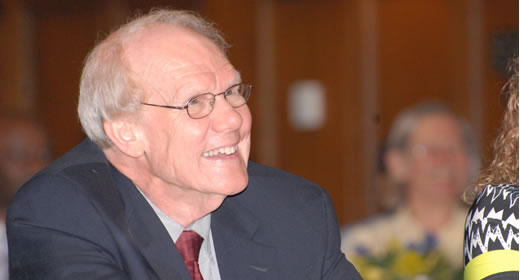
After an academic career spanning eight years at Duke University and some 35 years at the University of Michigan, Professor James S. House will retire this August. To celebrate his career, former students and postdocs participated in a day-long symposium at the Michigan League on June 2, sharing their research and emphasizing how their own intellectual agendas and accomplishments had been impacted by Jim's scholarship and mentorship.
House, an elected member of the American Academy of Arts and Sciences, the Institute of Medicine, and the National Academy of Sciences, has spent much of his career illuminating the role that social and psychological factors play in health and illness.
David R. Williams, the Florence Sprague Norman and Laura Smart Norman Professor of Public Health at Harvard University, was one of several former students to participate in the conference. "Many of [Jim's] former students mention his name with a deep appreciation and even reverence," writes Williams, who reports that he "enrolled in every seminar [Jim] taught, participated in a federally sponsored training program that he co-directed, worked as a teaching assistant and research assistant with him, and coauthored two papers with him." In all of these contexts, he found Jim to be an exceptional teacher, advisor, mentor, and human being.
"Jim is a tremendous scholar, whose work has helped to shape our understanding of socioeconomic health disparities and identify actionable demand-side policy solutions," says Susan M. Collins, the Joan and Sanford Weill Dean of Public Policy. "But he's much more than that. He's also a phenomenally warm person, who as a teacher and mentor has touched the lives of countless Ford School alumni—alumni who now hold leadership roles in health policy and related fields. He will be sorely missed."
Mark Mizruchi, Barger Family Professor of Organizational Studies and professor of sociology and business administration at the University of Michigan, hails Jim's outstanding former students, who provide an indication of the impact that House has had as a mentor and teacher. "What was less evident," says Mizruchi, "is the enormous influence that Jim has had on his colleagues as well. Although I was well into my mid-career stage by the time I arrived at Michigan, Jim has always served as a mentor to me, and I know that he has played a similar role for several of our other faculty members as well."
Howard Kimeldorf, a professor of sociology at the University of Michigan, echoed those sentiments, applauding House's academic leadership. "Jim's distinguished contributions as scholar, mentor, and colleague are well documented, widely celebrated and awarded," says Kimeldorf. "But he is also an outstanding academic leader….He was always intellectually engaged, open to all viewpoints, and, most importantly, functioned as an effective bridge-builder and highly skilled architect of compromise…."
The symposium, which U-M Professor Bob Schoeni called "a wonderful tribute to a wonderful scholar," was sponsored by the Departments of Sociology and Epidemiology, the Center for Social Epidemiology and Population Health, the Gerald R. Ford School of Public Policy, and the Survey Research Center and Director's Office at the Institute for Social Research.
Jennifer Ailshire, Sarah Burgard, Angela T. Haddad, Pamela Herd, Gloria Jones Johnson, Amy Schulz, and David Williams led the planning for this symposium.